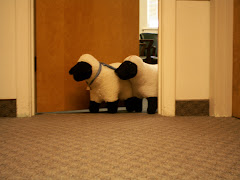
The hopes and fears of all the years are met in thee tonight. Verse One, O Little Town of Bethlehem From a Poem by Rev. Phillip Brooks, 1867 |
Hope. Fear. Faith. Courage.
Like the double-thump of a heart beating, two of these themes, Hope and Fear, continue to pulse, just as they have done for others throughout time. For example, I can't sing "O Little Town of Bethlehem" -- especially the last stanza of the first verse -- without these two themes coming to mind.
O little town of Bethlehem, how still we see thee lie.
Above thy deep and dreamless sleep, the silent stars go by.
Yet in thy dark streets shineth the everlasting light.
The hopes and fears of all the years are met in thee tonight.
What did it mean for all of humanity’s hopes and fears to meet in a little Middle-Eastern town some two millenia ago? After all, Hope and Fear had been meeting for a long, long time, in many places and under a variety of circumstances. And, God had not been silent or absent from his people in their hopes and fears.
But, at a particular point in human history, in that little town of Bethlehem, God came to meet Hope and Fear in-person, as a vulnerable baby we know as Jesus the Christ, the One who would suffer and die on the cross for us and for our eternal salvation. This Jesus came not just to meet Hope and Fear, but also to know them in every way that you and I would. And in Jesus Christ, Hope conquered Fear once and for all.
That said, Fear is real. Fear does not give up easily. Fear waits for an opportune time. Fear waits for the moment when we are most vulnerable, when we think we can overcome it on our own. Fear comes when we forget, ignore or try to remake the One who can cast out all fear. This One is Jesus Christ, the Living Word, Perfect Love. Jesus Christ is at the intersection where your hopes and fears come crashing together. He’s been there all the time.
|
Where do your hopes and fears meet these days? What do those hopes and fears look, sound, taste or feel like? Can you name them, or are they too deep to put into human words? Whatever they might be, take them to the manger, to the cross, to the One who has already met Hope and Fear head-on, for you and for all people.
Open your hands as though to hold a baby; see and cradle the Christ child there.
Open your Bible, and see it as the manger, the cradle where Christ is found.
See the Christ Child lifting little hands to take your hopes and fears into the cradle with Him.
Gaze up at your Christ on the cross with outstretched arms, Hope overcoming all fears, once for all.
Go forth into the days and months that stretch ahead.
Go with faith and good courage, knowing that the one who leads and guides is none other than Jesus Christ.
A blessed Christmas to you,
Pastor Sheepherder




